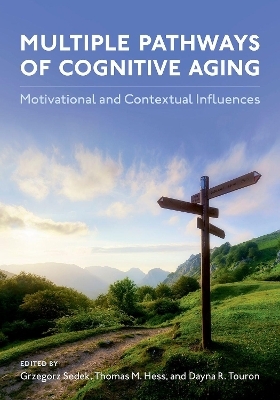
Multiple Pathways of Cognitive Aging
Oxford University Press Inc (Verlag)
978-0-19-752897-6 (ISBN)
- Lieferbar (Termin unbekannt)
- Versandkostenfrei
- Auch auf Rechnung
- Artikel merken
The study of aging and cognition has grown exponentially over the past 50 years, developing from a field dominated by experimentally based information-processing traditions to one represented by a more mature approach both conceptually and methodologically. In the past 10 years there has been growth in integrative approaches that incorporate behavioral, neuropsychological, and social information. In addition, there has been a growing recognition of the limitations associated with simple cross-sectional age-group comparisons, along with an increased use of more complex methods. This has resulted in the development of increasingly sophisticated research designs and analytic tools focused on understanding a multitude of potential mediators and moderators of cognitive change. The result has been a move away from negative-views of cognitive aging to one that is more nuanced and sensitive to contextual factors.
Multiple Pathways of Cognitive Aging explores the factors associated with adaptive functioning in later life. Its emphasis is on understanding both the factors underlying individual differences in change in cognitive functioning in later life and the nature of the compensatory mechanisms developed by most successful and active middle-aged and older adults. This includes a consideration of motivational factors as a driver of both cognitive change and adaptive functioning.
For students and researchers, Multiple Pathways of Cognitive Aging offers valuable insights into the field of cognitive development, along with innovative methodological approaches to help them in their own research.
Grzegorz Sedek is Professor of Psychology and Head of the Interdisciplinary Center for Applied Cognitive Studies (ICACS) at SWPS University of Social Sciences and Humanities in Warsaw, Poland. He has published research on such topics as cognitive aging, subclinical depression, and learned helplessness. Thomas M. Hess is a Distinguished Professor Emeritus of Psychology at North Carolina State University and recipient of the APA Baltes Distinguished Research Achievement Award.. He has published extensively on cognitive and social cognitive functioning in adulthood. Dayna R. Touron is Associate Dean of the College of Arts and Sciences and Professor of Psychology at the University of North Carolina at Greensboro. She is Associate Editor of Experimental Aging Research and on the editorial boards of Psychology and Aging and Journal of Experimental Psychology: Applied.
Section I: Introduction
Chapter 1: Introduction and Major Themes
Thomas M. Hess, Grzegorz Sedek, and Dayna R. Touron
Section II: Motivational Influences on Cognition in Older Adults
Chapter 2: Subjective Perceptions of Cognitive Costs: Determinants and Impact on Motivation and Engagement
Thomas M. Hess
Chapter 3: Motivated Memory for What Matters Most: How Older Adults (Selectively) Focus on Important Information and Events Using Schematic Support, Metacognition, and Meaningful Goals
Mary C. Whatley, Dillon H. Murphy, Katie M. Silaj, & Alan D. Castel
Chapter 4: Motivational Processes in Emotional Aging
Hannah Wolfe & Derek Isaacowitz
Chapter 5: The Positivity Effect: A Review of Theories and Recent Findings
Sarah J. Barber & Hyunji Kim
Chapter 6: Stereotyping and Effort Mobilization in Older Age: The Role of Self-Involvement
Gabriela Czarnek, Malgorzata Kossowska, & Michael Richter
Chapter 7: Motivational Reserve: The Role of Motivational Processes in Cognitive Impairment and Alzheimer's Disease
Simon Forstmeier, Myriam Verena Thoma, & Andreas Maercker
Section III: Contextual Influences on Cognition and Compensatory Mechanisms in Aging
Chapter 8: Social and Cultural Influences on Cognitive Aging
Angela Gutchess, Nicole M. Rosa, & Danielle B. Schwartz
Chapter 9: Why Do Some Older Adults Avoid Memory Retrieval When Acquiring a New Skill?
Christopher Hertzog & Dayna R. Touron
Chapter 10: Age Differences in Complex Decision Making and Judgment: The Role of Motivational Factors and Individual Differences
Klara Rydzewska, Maciej Ko?cielniak, Bettina von Helversen, & Grzegorz Sedek
Chapter 11: Motivation and the Social Context of Aging and Decision Making
JoNell Strough & Kelly Smith
Chapter 12: Controlling the Wandering Mind: Spontaneous Thought Content Suggests Compensation for Cognitive Decline
Dayna Touron
Chapter 13: The Potential for Socially Integrated and Engaged Lifestyles to Support Cognitive Health With Aging: Precursors and Pathways
Elizabeth A. L. Stine-Morrow, Ted W. Worm, Aron K. Barbey, & Daniel G. Morrow
Section IV: Maintenance of Cognitive Abilities and Modern Forms of Intervention
Chapter 14: There Is Nothing Wrong with Cognitive Aging, and Here Is What to Do About It
Paul Verhaeghen
Chapter 15: Cognitive Plasticity Induced in Older Adults by Cognitive Training, Physical Exercise and Combined Interventions
Soledad Ballesteros
Chapter 16: Adapting Algorithms on the Web to Deal With Cognitive Aging
Radoslaw Nielek, Justyna Pawlowska, Klara Rydzewska, & Adam Wierzbicki
| Erscheinungsdatum | 06.09.2021 |
|---|---|
| Verlagsort | New York |
| Sprache | englisch |
| Maße | 249 x 178 mm |
| Gewicht | 862 g |
| Themenwelt | Geisteswissenschaften ► Psychologie ► Allgemeine Psychologie |
| Geisteswissenschaften ► Psychologie ► Biopsychologie / Neurowissenschaften | |
| Geisteswissenschaften ► Psychologie ► Verhaltenstherapie | |
| Medizin / Pharmazie ► Medizinische Fachgebiete ► Geriatrie | |
| ISBN-10 | 0-19-752897-X / 019752897X |
| ISBN-13 | 978-0-19-752897-6 / 9780197528976 |
| Zustand | Neuware |
| Informationen gemäß Produktsicherheitsverordnung (GPSR) | |
| Haben Sie eine Frage zum Produkt? |
aus dem Bereich


